Some people had been waiting 12 years; others for 24 years; others for 50 years; and a few others for over 70 years. The day finally arrived, Saturday March 16, 2024. Bunun people of all ages gathered to praise and thank God for the new and complete Bunun Bible.
Over 70 years ago this Bible was the dream of the very first generation of Bunun Christians. They had heard the Gospel of Jesus Christ preached using the Japanese language on the east coast of Taiwan and in their high mountain villages. For example, the word they learned for ‘God’ was ‘kamisama’, ‘Jesus’ was ‘iisu’, ‘the Holy Spirit’ was ‘kamisama tu is-aag’, ‘king’ was ‘ugti’. The first Bibles used by Bunun people were written in Japanese. Then gradually Bibles written in Taiwanese Romanized script and Han-Chinese or Mandarin script were introduced to the growing Bunun churches. Their own ancestral Bunun language which was thousands of years old had never been written down. It had always been an oral or spoken language.
Before the Japanese empire ruled Taiwan, 1895-1945, Bunun villages were scattered in the high central mountains. Traditionally, men hunted deer or wild boar and provided for their families; while women wove, made clothing and raised the children. Over time, and since mountain villages were isolated from one another, the Bunun language developed into six dialects. The new Bible uses the largest dialect but also includes some words from the second largest one. The national government estimates there are currently around 60,000 Bunun people in Taiwan, which makes them the fourth largest indigenous group after the ‘Amis, Tayal and Paiwan peoples. Thus far, 6100 new Bibles have been printed; we pray for more readers and re-printings in the future.
In the early 1950s, visionary leaders in the growing Presbyterian Church in Taiwan (PCT) and the Bible Society in Taiwan (BST) asked the first generation of Bunun pastors and elders, “Would you like a Bible in your own language?” They replied, “Of course! But we have no written language. Who can help us?” A gifted Taiwanese minister by the name of Rev. Hu Wen-tse had already felt God’s call to cross-cultural mission work among the Bunun people. He was assigned to learn the Bunun language, develop a script to write down spoken words and sentences, then work with leaders in the young Bunun churches to start translating portions of the Bible into their ancestral language. A Bunun teenager by the name of Manias Istasipal (later named Chang Yu-fa in Han-Chinese) became one of his helpers. Rev. Hu taught Manias how to use a typewriter, while Manias and others taught Rev. Hu elementary then more advanced Bunun. Seventy years ago, they started to dream of a complete Bible written in Bunun. But it would take a long time and the dedicated work of many people to produce it.
In the 1950s and 1960s, Rev. Hu and other pastors began to translate individual books of the New Testament (NT). For example, 1&2 Timothy were published in 1962. In those days of martial law in Taiwan, the government insisted that the Bible Society use a phonetic script (ㄅㄆㄇㄈ) to transcribe the 15 consonants and 3 (only!) vowels used in Bunun. The phonetic script was based on the one Bunun children had to learn in school to speak and write Mandarin-Chinese. But it was imprecise and could not reproduce the sounds of Bunun as accurately as a Roman (a-b-c) script could.
After about 20 years, in 1974, the first Bunun New Testament was finally published. The Bunun text was written using a more precise Roman script; and a popular Han-Chinese version was cut and pasted above it. A previous printing of the NT (in whole or in part I am not sure) which used only Roman script, was confiscated by local police on the authority of the Nationalist KMT government. [See the PCT’s reaction in “OUR APPEAL, by The Presbyterian Church in Taiwan: Concerning the Bible, the Church and the Nation (18 November 1975)”; https://english.pct.org.tw/Article/_enArticle_public_19751118.html.] Japanese influence on the 1974 Bunun NT was still strong, as one can see from the fact that the major theological terms listed above (and many others) remained unchanged. But the search had already begun for terminology that grew out of Bunun language and culture.
In 2000, a revised Bunun New Testament plus portions of a few books in the Old Testament (OT), was published. It had not been easy work. Elderly Bunun speakers did not always see eye-to-eye with younger translators. People from each of the six Bunun dialect groups wanted the Bible to sound exactly like their own dialect. The BST had decided (rightly) that the first Bunun Bible should use the largest one or two dialects, which were spoken and/or understood by most Bunun people, before they considered translating into the smaller dialects which had far fewer speakers. The search continued to recover older Bunun words or create new ones to translate major biblical terms. But the growing influence of Mandarin-Chinese was also being felt. In the 2000 Revised NT + Short OT Bible, the word for ‘God’ was changed to ‘Sasbinaz Dihanin’ (Lord in heaven), ‘YHWH/LORD’ was ‘Iehuba’ (Jehovah), ‘Jesus’ became ‘Iesu’ (like Mandarin), ‘the Holy Spirit’ became ‘Sele’ (a Japanese term), while ‘king’ was ‘paliskadan daingaz’.
In 2005, leaders in the Bunun churches began to rally again. They wanted to translate the remaining books in the Old Testament so people could have a complete Bible. And they wanted to revise the 2000 Shorter Bible further to make it more and more like spoken Bunun, yet still a faithful translation of the Bible’s original languages. Through the prayers and efforts of Bunun church leaders like Revs. Anu, Alang, Aziman, Ibi, Manias, Sai, Suna and Vilian, who represented the three Bunun presbyteries in the PCT, and Rev. Sing ‘Olam (a gifted ‘Amis minister and Associate General Secretary in the PCT), the project was officially started in the summer of 2012. That’s when the BST assigned me to join the team as their Translation Advisor. One can see some of the revisions introduced in the new and complete 2024 Bunun Bible. The word for ‘God’ is ‘Tamadaza’ (Father above), ‘YHWH/LORD’ is ‘Sasbinazdihanin’ (Lord in heaven), ‘Jesus’ is ‘Isus’, ‘the Holy Spirit’ is ‘Masaningsing tu Is-aang’ and ‘king’ is ‘taimisiduhdaingaz’.
We faced other challenges in addition to complicated Bunun language issues and how best to define important biblical terms. In 2012, Rev. Manias (already in his 70’s) was assigned the role of lead or main translator. From using a typewriter with Rev. Hu in the 1950’s, Manias now had to learn how to use a computer and the latest Bible translation software, Paratext. He was an excellent student, though he had to change his laptop and keyboard three or four times due to old typing habits! Manias and other members of the Bunun review team attended several Bible translator training events we hosted at the BST, which examined topics like translation techniques, how to create the team’s own Bunun spell-checker, how to check major biblical terms for consistency in translation, and how to translate parallel passages like the Ten Commandments or Jesus’ many sayings in the Gospels.
We also had the challenge of “simply” trying to gather for team meetings. If we met as a team on the east coast of Taiwan, those from the central mountains had to drive 9 hours to get there. And vice versa. When Covid-19 struck, we had to stop meeting in-person altogether. That’s when Manias and I had to learn how to use Skype to communicate from opposite sides of the globe, 12 time zones apart.
In February 2023, I had resumed my regular in-person visits to Taiwan. Manias and I had just finished all the final checks in Paratext. The biblical maps and the Introduction were all done too. Along with the team’s convenor, Rev. Sai, we could happily say the Bunun translation for the whole Bible was now “final” and ready for typesetting. Within days, Manias was admitted into hospital for cancer treatment. Rev. Sai and I kept Manias and his family informed of the progress as we proofread the typeset text with its two columns of Bunun and Han-Chinese. Sadly, Manias died in hospital three months later. Somewhat like Moses, who could see but not enter the promised land, Manias knew the work of his lifetime was completed, though he never held the new Bible in his hands.
Some people had waited a long time. But praise God for his steadfast love and faithfulness! Bunun people now have the complete Bible in their own ancestral language. Translators and reviewers offered their very best to God over many years under numerous challenges. They relied on God and the prayers and support of Bunun churches, plus friends in the PCT and our own PCC. (The Presbytery of Waterloo-Wellington is a mission partner with the Bunun Presbytery on the east coast of Taiwan.)
The worship service to praise and thank God for the publication of the complete Bunun Bible was attended by around 200 people. Some had travelled by rented tour buses for over five hours to get here. We met on a gorgeous summer-like day outdoors under the roof of a community activity centre beside Ai-nung Presbyterian Church. The church is part of a new arrangement of Bunun mountain villages, which were relocated here on the lowlands, after the destructive flooding on August 8, 2009. The South Bunun Presbytery led the Central Bunun and (east coast) Bunun Presbyteries in hosting the celebration.
During the 2-hour worship service, we sang hymns, prayed and confessed our faith using the Apostles’ Creed, all in Bunun. The Bible reading for this special occasion was taken from Isaiah 48:17-18. It was read in both Bunun and Mandarin.
17 Isia taki-Islail masaningsing tu Tamadaza,
maupa cin a kaitsuhis masuu a Sasbinazdihanin tupa tu:
Sasbinazdihanin saikin isuu tu Tamadaza;
cis-uni mas na is-insial masuu, at isnavaan ku kasu;
tahuan ku kasu mas na lahaiban tu daan.
18 Hadang anata-aza kasu mas inaak tu sinkakalun!
Mais ta-aza kasu mas inaak tu sinkakalun,
maaz a is-alisvala hai na maszang mas danum sian vahlas tu nitu susuhci;
maaz a mapisial malkabunun hai na maszang
mas kacinpahdaingaz tu danum mutaul. (Bunun 2024)
17以色列神聖的上帝, 救贖你的上主這樣說:
我是上主—你的上帝;
為了你的益處,我教導你; 我指示你該走的道路。
18我多麼希望你聽我的命令!
如果你聽我的命令, 平安就像河水滔滔不絕;
公義就像浪濤滾滾而來。 (Today’s Chinese Version 2019)
17 This is what the Lord says—
your Redeemer, the Holy One of Israel:
“I am the Lord your God,
who teaches you what is best for you,
who directs you in the way you should go.
18 If only you had paid attention to my commands,
your peace would have been like a river,
your well-being like the waves of the sea.” (NIV 2011)
The sermon was preached by the current Moderator of the PCT’s General Assembly, Rev. Phang Chu-fung, who happens to be a Hakka friend of mine. He spoke in Mandarin as a common language, with translation into Bunun. Interesting. When the Hakka Bible was published in 2012, the preacher at our celebration was a Tayal minister, also Moderator of the PCT’s GA. A testimony to the precious ethnic diversity and mutual sharing across languages and cultures in the PCT.
Rev. Sai, Convenor of the Bunun Bible Translation Committee, presented an historical overview of what he called 13 stages since 2005 which led to the publication of this first-ever complete Bunun Bible. The stages included such things as: preliminary discussions over several years which in 2012 led to choosing the main translator and the team which would help him review the translation and offer suggestions to correct or improve it; the review team’s many meetings in south, central and east Taiwan, in mountain churches and on the lowlands; elders and deacons from the three Bunun presbyteries, who served as readers and offered valuable feedback on the team’s translation; all the Paratext checking done by Rev. Manias and me, the BST’s Translation Advisor, especially over the internet during the pandemic; the BST’s Publishing Department who over five months in 2023 did all the complicated work of typesetting the Bunun text in parallel columns with Today’s Chinese Version (2019); and the Korean Bible Society which did the final printing and book binding.
We all stood up to read responsively a dedication for the new Bible. Bunun participants then pledged before God to use it. Special guests brought greetings from various supporting organizations and offered prayers and blessings: ‘Amis minister Rev. Chang, who is the PCT General Assembly’s Vice Moderator and current Convenor of the PCT’s Mother Language Bible Translation Committee; Sediq minister Rev. Peto, who is Chair of the PCT’s Indigenous Mission Committee; and BST Board member Elder Hsieh, who is both a brilliant civil engineer and a dedicated elder. One visitor recalled that in 2005 the PCT’s one Bunun Presbytery had divided into three Bunun presbyteries; but this Bible translation project brought the team and their supporting churches together in a shared mission project which promises to bless all the churches for generations to come. I too was inspired by representatives from diverse ethnic groups, sharing the love of Jesus Christ from our different ancestral backgrounds.
Gifts were presented to all the members of the Bible translation team who served over the years. We were deeply moved by gifts presented to the widows of our beloved coworkers who died before they could hold in their hands the fruit of their labours. I thought especially of our lead translator Rev. Manias and another senior translator Rev. Alang, who died respectively in June and July 2023, both at the age of 83. Gifts were also given to the moderators of the three Bunun presbyteries to thank them and their churches for their support in prayer and with finances over the years. The high hope in 2012 was to complete the project in five years; thankfully, churches kept on supporting sacrificially to the very end.
Cards, emails and more greetings and blessings were sent from the PCT’s General Assembly, the BST and numerous churches and friends.
One of our gifted women translators, Rev. Abus, and other translation team members led us all in a beautiful Bunun call-and-response song, most fitting for the celebratory occasion. Rev. Phang gave the final benediction in Hakka and Bunun which was music to my ears.
The celebration closed with a delicious buffet lunch, where we all had time to greet old friends and encourage one another in our ongoing Christian mission of sharing God’s Word in Bunun with Bunun families and friends wherever they live.
So many years, and so many people who helped produce this Bunun Bible. Now a new stage begins. The BST has already made the Bunun Bible available on its website in digital format. Churches can use it easily in corporate worship, and people can access it on their cellphones too.
May God bless all the Bunun churches and help them read and use their new Bibles to share the Gospel and disciple future generations in the love and the ways of our Saviour Jesus Christ.


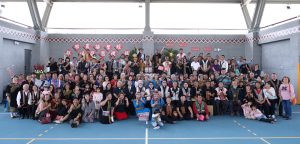
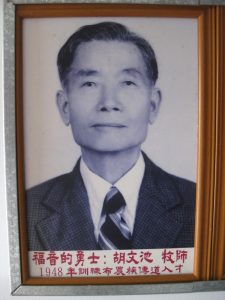
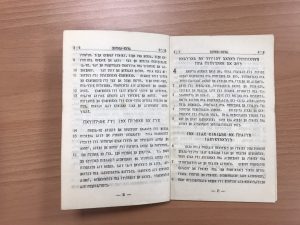
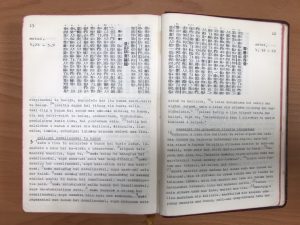
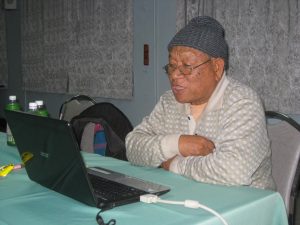
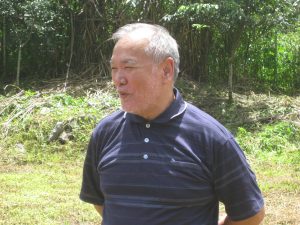
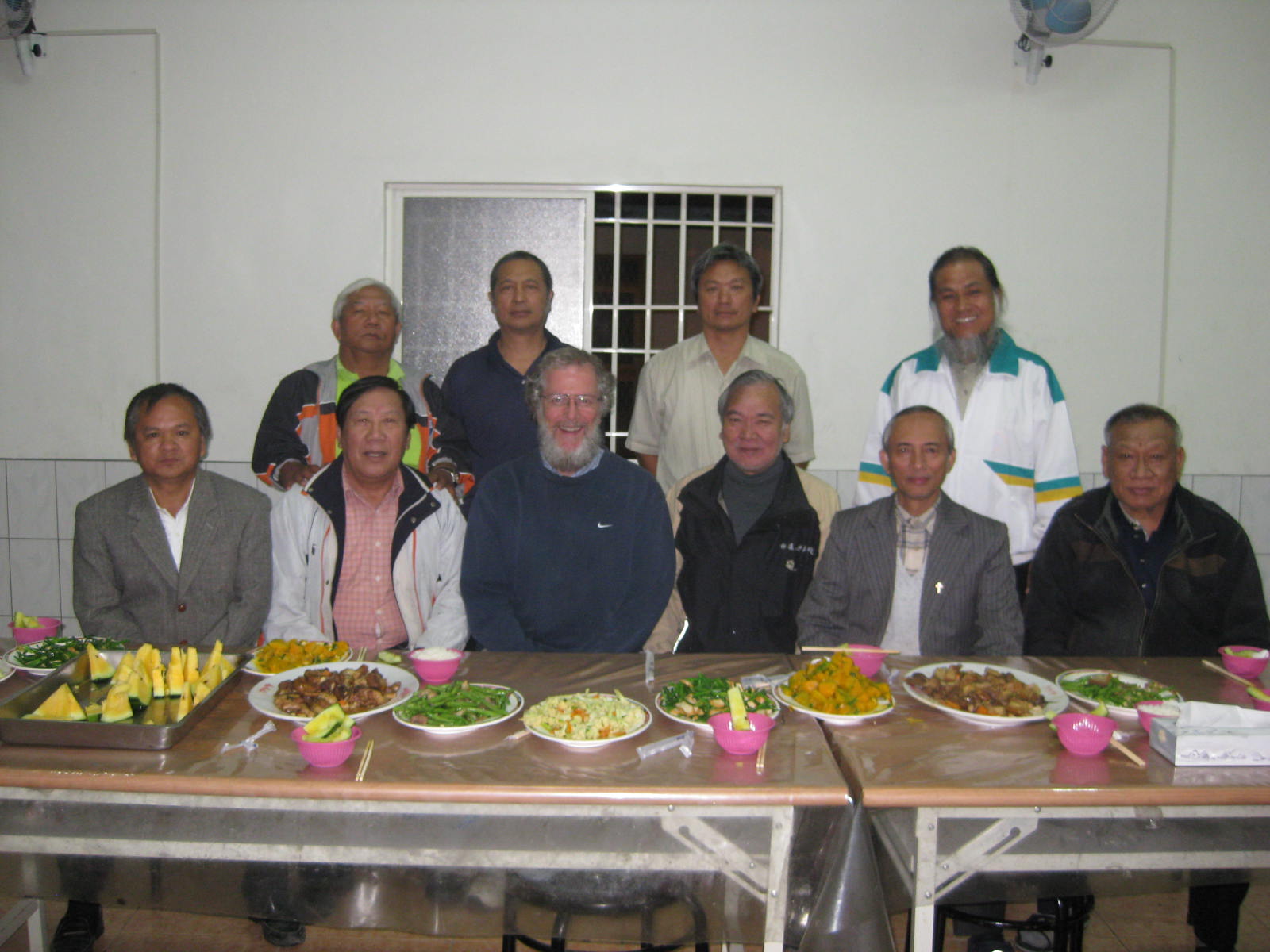

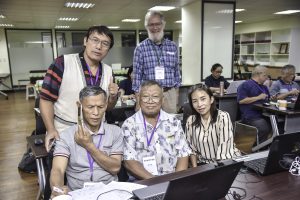
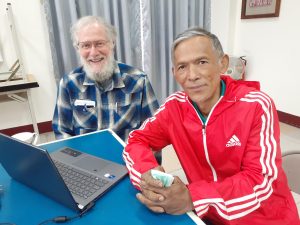
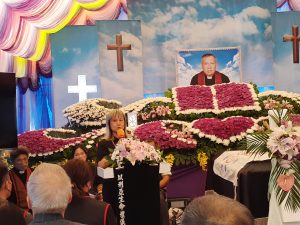

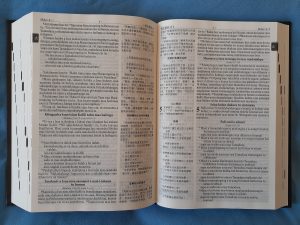
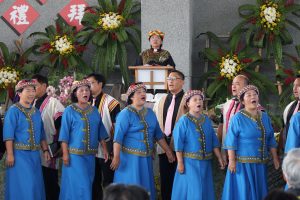
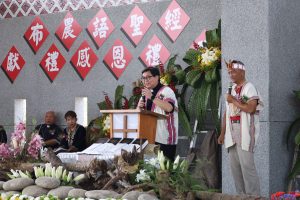
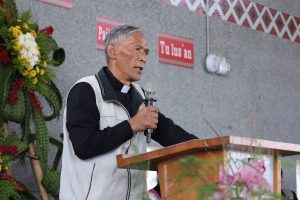
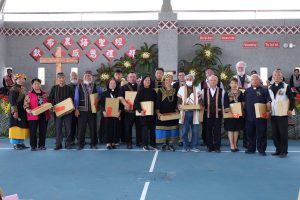
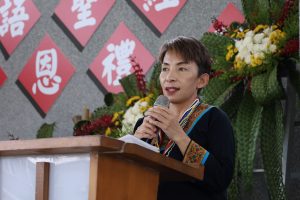
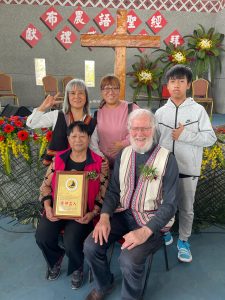

Congratulations on the completion of the Bunun Bible. It’s only possible through
the grace and blessings from the Most High. All glories be to Him.!